
Unknown No Dog Biscuits Today 1939

And all of a sudden (well, not that sudden) there’s so much stuff about China. I started off today reading an article in Nikkei entitled “China’s Yuan Policy Has Made Hong Kong Redundant”, and I thought: that is absolute nonsense. The idea seems to be that Shanghai would take Hong Kong’s place, as the renminbi (yuan) turns into a global currency.
That’s just wishful thinking. Or maybe a reaction to America’s new attitude towards China. The main sticking point for Beijing is a conundrum it cannot solve. The CCP wants to have BOTH a global currency AND total control over that currency. It will have to choose between the two, and cannot make up its mind. So it pretends it does’t have to choose.
Sure, there has been some advancement for the yuan, but I bet most of that is on the back of the Belt and Road (BRI), and that will turn out to be one of the main victims of the coronavirus. The BRI is China’s very clever way of exporting its overproduction, but potential buyers have other things on their mind today.
Meanwhile, even with that, the yuan is used in only 1.8% of cross-currency payments. So the claim that the yuan is used in 30% of China’s trade needs to be taken with a huge salt shaker.
And yes, it may be true that the yuan is now the sixth most used currency in international payments, but that’s only because there is no competition for the USD, and what competition does exist come from the euro.
The sudden, and rushed, take-over of Hong Kong with the new security law will not help China’s plans to be accepted internationally. US big tech is withdrawing, and even some Chinese tech is moving away.
The world’s large investors will not put their money into something that Xi Jinping can declare devalued by 50% on a rainy morning when he sees fit. He will have to cede that kind of control.
And reading through all this, why am I getting the feeling that China does not feel well, that its leaders perhaps have fallen victim to bouts of insecurity?

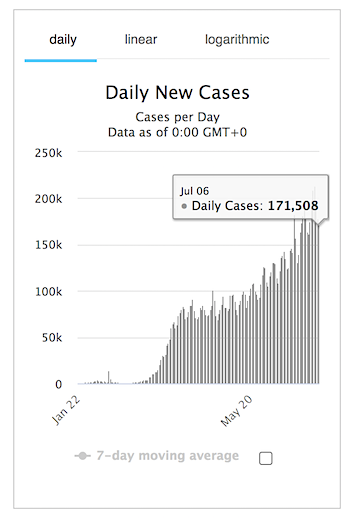
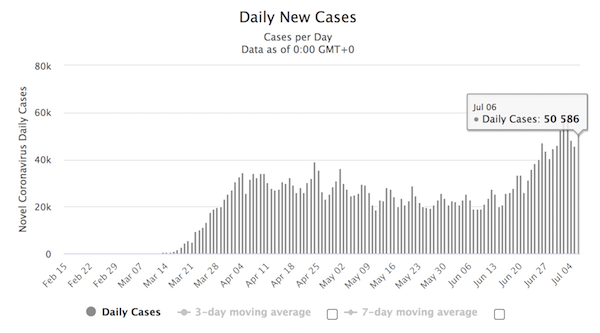

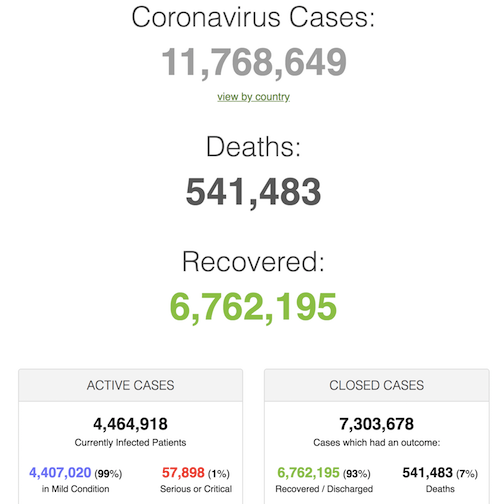

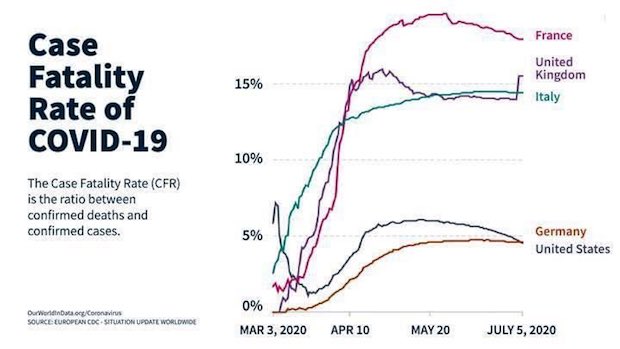

“You can tell someone’s case for the mythical global yuan is not serious when they write “the yuan is now the sixth most used currency in international payments” rather than “the yuan accounts for about 1.8% of cross-currency payments..”
• China’s Yuan Policy Has Made Hong Kong Redundant (Nikkei)
Many have claimed that the national security law China has imposed on Hong Kong will be the death of the city, stifling free speech and driving away businesses. But 10 years ago, China made Hong Kong part of a plan which, even more certainly than the national security law, is rendering the city redundant. For years, Hong Kong has been the entrepot for China’s trade in the region — it accounts for 6.3% of China’s total trade — and a leading international financial center. It has provided the infrastructure for the West to invest in mainland China: about two-thirds of foreign direct investment into and from there goes through Hong Kong.
In 2010, China made Hong Kong a critical component of its policy aimed at developing the yuan as an international currency that non-Chinese residents could hold as an asset or use to pay for international transactions. Before 2010, the yuan had almost no international use or circulation, with less than 1% of China’s trade settled in it. The Chinese monetary authorities had to balance the need to have an international currency and the risk of allowing capital to flow freely in and out of the domestic market. In principle, international currencies need to be fully convertible, but for China this was not a viable route.
Hong Kong’s “one country, two systems” principle provided the solution to China’s conundrum and has been pivotal to the emergence of yuan-led finance, underpinning rising demand and facilitating the yuan business. Hong Kong’s judicial institutions, independent from mainland China, were at the heart of its role as a bridge between the Chinese planned economy and the Western market economy. The move worked, and although the international use of the Chinese currency remains limited, it has undergone significant growth. The yuan is now the sixth most used currency in international payments and is used for settling approximately 30% of China’s trade. Yuan-denominated financial instruments are used more in projects that are part of China’s Belt and Road Initiative.
Yuan activities now account for a large chunk of Hong Kong’s trading as an international financial center, according to estimates by market participants. But rather than making Hong Kong stronger, this increases its dependence on Beijing — and hence its vulnerability. By becoming part of the yuan strategy, a policy-led initiative where Chinese policy makers set the pace and guide the market, Hong Kong has been following Beijing’s lead. A bigger, but related, problem for Hong Kong is that by strengthening the yuan trade, it is also strengthening one of its mainland rivals and making itself less important. Around the time it launched its yuan policy, China also put in place a plan to develop Shanghai as its top international financial center by 2020. According to the latest Global Financial Centres Index, Hong Kong at sixth now ranks lower than Shanghai at fourth. Ten years ago Hong Kong was the most important financial center in Asia and in third place globally after London and New York, while Shanghai ranked 11th.

Just yesterday, Beijing talked about “fostering a healthy bull market”. And what the Fed can do, the PBOC can too. Buy buy buy.
• China Shares Rally, Asian Stocks Take A Breather (R.)
The Chinese share market extended its positive run on Tuesday, in line with the mainland government’s push for a stronger market, while the rest of the region turned cautious on equities. MSCI’s broadest index of Asia-Pacific shares outside Japan see-sawed during the local session and was down 0.2%, after it briefly traded in positive territory. The negative performance on Tuesday came after the index rose 7% which took it to a 4-1/2 month high in the past five trading sessions. Japan’s Nikkei gave up 0.7% while U.S. stock futures shed 0.25% in Asia after hefty gains on Monday in the wake of surging Chinese shares.
In China, Shanghai’s blue chip CSI300 index and Shenzhen shares, which had gained more than 13% in the past five sessions, rose a further 1.5%, led by rises in the tech sector. Ample Finance Group director Alex Wong said while Chinese market sentiment was positive, investors remained cautious to the risk of that being short-lived. “The mood is still quite strong…and I think people will be willing to hold on for a while as we absorb some of the positive news in the world,” Wong told Reuters in Hong Kong. Analysts said jawboning by the Chinese government through a state-sponsored journal on the importance of “fostering a healthy bull market” published on Monday had spurred the buying binge in mainland Chinese shares.
The current China rally has echoes of the past, especially during 2007 and in the buying binge that followed the crash in 2015 that was largely driven by Chinese retail investors. “Shades of John F. Kennedy’s ‘Ask not what your country can do for you’ inauguration speech here and as close as you might get to a Chinese government ‘put’ as anything the Fed has done to date vis-à-vis the U.S. stock (and credit) markets,” said Ray Attrill, head of FX strategy at NAB, in a research note.

The rich can leave if they want to. The rest cannot.
• New Security Law Starts To Break Down Hong Kong’s Pro-Democracy Economy (R.)
As soon as Hong Kong’s new national security law came into force last week, Ivan Ng removed all the protest-themed paintings, posters and flags from the list of items for sale at his Onestep Printing shop. Sandra Leung at Wefund.hk, which sells protest-themed artwork and accessories, said she has suspended sales of protective gear worn by protesters, flags with the slogan “Liberate Hong Kong,” and other items carrying popular chants. Jeffrey Cheong, owner of Hair Guys Salon, said he closed his shop down for a few days last week to remove pro-democracy decorations. Ng, Leung and Cheong are three of the 4,500 or so small businesses in Hong Kong’s “yellow economy,” which supports pro-democracy protesters and vice versa. That circle of support is showing signs of weakening in the face of the new law.
“We took down all the protest-related products right after the law was implemented, because the law doesn’t have very clear boundaries of (what constitutes) subversion,” Ng said. In the past week, he said his overall sales are down as much as 80%. Leung said she had withdrawn items for sale she described as “sensitive,” such as gas masks used by protesters and items with anti-police slogans. The new law prohibits what China describes broadly as secession, subversion, terrorism and collusion with foreign forces, with up to life in prison for offenders. It came into force late last Tuesday, about an hour before the 23rd anniversary of China taking back control of the former British colony.
The Hong Kong government went further on Friday, declaring the popular protest slogan “Liberate Hong Kong! Revolution of our times” illegal. Public libraries have started to review books written by pro-democracy activists to see whether they violate the new law. Hong Kong and Beijing authorities insist the city retains a “high degree of autonomy” but critics say the law effectively brings Hong Kong under the control of China’s Communist Party and violates China’s promise to safeguard Hong Kong’s freedom for 50 years after the 1997 handover. Some businesses told local media they had been visited by the police who warned them that pro-democracy decorations were against the new law.

Which side of The Great Firewall do you want to be on?
• TikTok Says It Will Exit Hong Kong Market Within Days (R.)
TikTok will exit the Hong Kong market within days, a spokesman told Reuters late on Monday, as other technology companies including Facebook suspend processing government requests for user data in the region. The short form video app owned by China-based ByteDance has made the decision to exit the region following China’s establishment of a sweeping new national security law for the semi-autonomous city. “In light of recent events, we’ve decided to stop operations of the TikTok app in Hong Kong,” a TikTok spokesman said in response to a Reuters question about its commitment to the market. The company, now run by former Walt Disney Co executive Kevin Mayer, has said in the past that the app’s user data is not stored in China.
TikTok has also said previously that it would not comply with any requests made by the Chinese government to censor content or for access to TikTok’s user data, nor has it ever been asked to do so. The Hong Kong region is a small, loss-making market for the company, one source familiar with the matter said. Last August, TikTok reported it had attracted 150,000 users in Hong Kong. Globally, TikTok has been downloaded more than 2 billion times through the Apple and Google app stores after the first quarter this year, according to analytics firm Sensor Tower. The source said the move was made because it was not clear if Hong Kong would now fall entirely under Beijing’s jurisdiction in light of the new law.

Easy pickings.
• China Slams US As It Joins Global Arms Trade Treaty At UN (R.)
China on Monday joined a global arms trade treaty spurned by the United States, taking a swipe at U.S. President Donald Trump’s administration by accusing it of bullying, unilateralism and undermining efforts to combat global challenges. China’s U.N. ambassador, Zhang Jun, said he had deposited China’s instrument of accession to the treaty, which regulates a $70 billion global cross-border trade in conventional arms and seeks to keep weapons out of the hands of human rights abusers. China, which announced its plans in September, becomes the 107th party to the pact, approved by the U.N. General Assembly in 2013. Then-U.S. President Barack Obama signed it, but it was opposed by the National Rifle Association and never ratified by the U.S. Senate.
Trump said in April last year that he intended to revoke the status of the United States as a signatory. In July 2019, the United States told U.N. Secretary-General Antonio Guterres that Washington did not intend to become a party to the treaty and that it had no legal obligations from its 2013 signature. Without naming the United States, but amid escalating tensions between Beijing and Washington, Zhang said in a statement that a “certain country … walked away from international commitments, and launched acts of unilateralism and bullying.” [..] China was the fifth-largest global arms exporter between 2014 and 2018, according to the Stockholm International Peace Research Institute, although China itself does not publish figures for how many arms it exports.

A comment on Twitter about an article in German in Handelsblatt:
”Deutsche Telekom has doubled down on Huawei even as concerns rose, including discussions w/Chinese firm about how to get around US sanctions & “tactical” announcements to get T-Mobile/Sprint deal in US approved..”
• US Restrictions Drove Deutsche Telekom And Huawei Closer Together (Pol.eu)
Global telecoms giant Deutsche Telekom strengthened its strategic partnership with Huawei last year despite growing defiance toward the dominant Chinese 5G vendor, documents reviewed by POLITICO show. The internal company records describe how Deutsche Telekom and Huawei agreed on a deal in mid-2019 that said the Chinese supplier would take measures to avoid supply chain disruption caused by U.S. measures, as well as cover the costs of potential damages and delays. The deal was struck just weeks before the U.S. administration imposed restrictions on businesses dealing with the Chinese firm in May 2019 — a milestone for Washington’s efforts to push back against Huawei’s dominance on 5G equipment.
It laid the groundwork for a partnership between the two companies for the early rollout of 5G networks in Europe, despite national lawmakers’ efforts in key markets like Germany, the Netherlands and Poland to reduce the use of Chinese equipment. In the months after the deal, the companies underlined mutual commitments to treat each other in preferential ways. Deutsche Telekom executives described Huawei repeatedly as a “strategic partner” that is “key for our 5G plans,” according to the internal documents. On Huawei’s end, Deutsche Telekom was described as a “preferred customer” for its 5G equipment. Deutsche Telekom has repeatedly declined in the past to disclose how much of its networks consist of Huawei equipment.
But in its internal communication, it has likened the scenario of not being able to use Huawei in its broader 5G rollout to “armageddon,” a recent report in German paper Handelsblatt showed. [..] At the core of the mutual agreement is a commitment by Huawei to shoulder the burdens and costs of the U.S. restrictions that have bogged down the Chinese vendor in the past year. “This pledge by Huawei to pay for any disruption adds to that incentive to stick with Huawei,” said Thorsten Benner, director of the Berlin-based Global Public Policy Institute, calling it a “care-free package” offered to Deutsche Telekom.

Targeting China once more?!
• US To Force Out Foreign Students Taking Classes Fully Online (R.)
Foreign students must leave the United States if their school’s classes this fall will be taught completely online or transfer to another school with in-person instruction, the U.S. Immigration and Customs Enforcement (ICE) agency announced on Monday. It was not immediately clear how many student visa holders would be affected by the move, but foreign students are a key source of revenue for many U.S. universities as they often pay full tuition. ICE said it would not allow holders of student visas to remain in the country if their school was fully online for the fall. Those students must transfer or leave the country, or they potentially face deportation proceedings, according to the announcement.
Colleges and universities have begun to announce plans for the fall 2020 semester amid the continued coronavirus pandemic. Harvard University on Monday announced it would conduct course instruction online for the 2020-2021 academic year. The ICE guidance applies to holders of F-1 and M-1 visas, which are for academic and vocational students. The State Department issued 388,839 F visas and 9,518 M visas in fiscal 2019, according to the agency’s data. The guidance does not affect students taking classes in person. It also does not affect F-1 students taking a partial online course-load, as long as their university certifies the student’s instruction is not completely digital. M-1 vocational program students and F-1 English language training program students will not be allowed to take any classes online.

Pretty amazing story. But scary too.
• South Korean COVID-19 patient Recovering After Double Lung Transplant (R.)
After a record 112 days on a specialised life-support system, a South Korean COVID-19 patient is recovering from double lung transplant surgery, doctors say, in only the ninth such procedure worldwide since the coronavirus outbreak began. The 50-year-old woman was diagnosed with the disease and hospitalised in late February and then spent 16 weeks on extracorporeal membrane oxygenation (ECMO) support, which involves circulating a patient’s blood through a machine that adds oxygen to red blood cells. That’s the longest that any COVID-19 patient in the world has spent on ECMO support, her doctors said.
Various drugs such as the anti-malarial hydroxychloroquine, the HIV treatment Kaletra and steroids failed to stop her pulmonary fibrosis – scarring in the lungs – from worsening, said Dr Park Sung-hoon, professor of pulmonary and critical care medicine at Hallym University Sacred Heart Hospital. That left few options other than a lung transplant. “The probability of success in lung transplants on ECMO patients is 50%, and fortunately, our patient was well prepared before the surgery when we found the donor,” said Dr Kim Hyoung-soo, director of the hospital’s ECMO programme, who was in charge of the surgery.
The patient declined to be identified or interviewed. The doctors who conducted the eight-hour surgery described her destroyed lungs as hard like rock. She had an acute respiratory distress syndrome (ARDS) when she came to hospital, Park said, and could not live without the ECMO machine’s help. ECMO is typically used on patients who need more help than ventilators can provide, and who are considered to have a 90% chance of dying. Half of patients recover in two to three weeks on ECMO, and a lung transplant is considered for those who don’t, Kim said.

Stay home.
• Hospitalizations Jump 50% In California As Coronavirus Infections Soar (R.)
New coronavirus cases soared in California over the July Fourth weekend, stressing some hospital systems and leading to the temporary closure of the state capitol building in Sacramento for deep cleaning, officials said on Monday. The number of people hospitalized with COVID-19 has increased by 50% over the past two weeks to about 5,800, Governor Gavin Newsom said at a briefing. About a third of those hospitalized were in Los Angeles County, state and local records showed, with about 630 confirmed and suspected coronavirus patients requiring intensive care. And 25% of the hospitalizations in the county in July were among patients aged 18 to 40, health officials said, as new cases increasingly hit a younger population that may have been lax about safety precautions in recent weeks.
Farther north, nearly 1,400 inmates at San Quentin State Prison have been sickened by the virus, putting pressure on hospitals in Marin County, where the facility is located, Newsom said. All told, 271,684 Californians have tested positive for the virus, including 11,529 in the past 24 hours, state records show. About 6,300 have died. Determined to slow the spread of the disease over the holiday weekend, state alcohol regulators visited nearly 6,000 bars and restaurants to make sure they were complying with new rules banning indoor dining and closing bars that do not serve food, Newsom said.
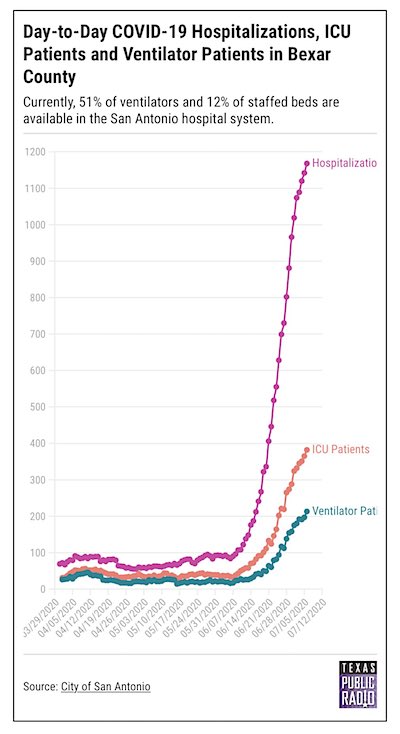

Turns out the 2nd wave concerns lockdowns.
• Six Week Lockdown For Melbourne As Record 191 New Cases Reported (Conv.)
The Victorian government will lock down all metropolitan Melbourne for six weeks from Wednesday night, as a new wave of the coronavirus takes hold in the city. The lockdown will also cover the Mitchell Shire, north of Melbourne, which includes the towns of Broadford, Seymour, Kilmore, Tallarook, Pyalong and Wallan. Under the restrictions, people will only be able to leave their home to shop for essential goods and services, for care and compassionate reasons, exercise, and for work and study if it cannot be conducted from home. The dramatic action comes as the Victoria-NSW border closes on Tuesday night, amid some chaos in Albury-Wodonga, and follows the lockdown of suburbs in 12 Melbourne postcode areas, and the “lock in” of 3,000 residents in nine community housing towers.
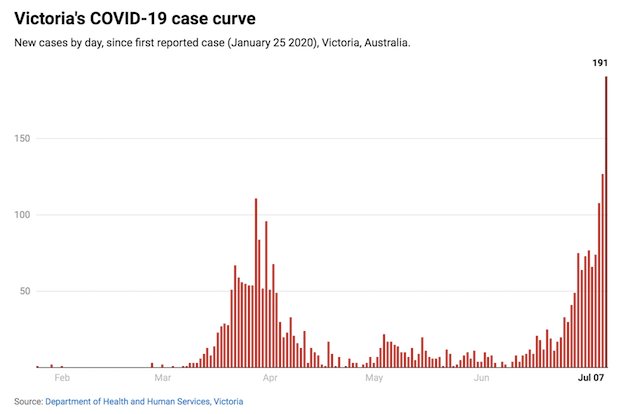

Brazilian media reports he tested positive.
• Brazil’s Bolsonaro Says Lungs ‘Clean’ After Coronavirus Test (R.)
Brazilian President Jair Bolsonaro said on Monday he had undergone another test for the novel coronavirus and his lungs were “clean,” after local media reported he had symptoms associated with the COVID-19 respiratory disease. Bolsonaro has repeatedly played down the impact of the virus, even as Brazil has suffered one of the world’s worst outbreaks, with more than 1.6 million confirmed cases and 65,000 related deaths, according to official data on Monday. CNN Brasil and newspaper Estado de S.Paulo reported that he had symptoms of the disease, such as a fever. Bolsonaro told supporters outside the presidential palace that he had just visited the hospital and been tested.
“I can’t get very close,” he said in comments recorded by Foco do Brasil, a pro-government YouTube channel. “I came from the hospital. I underwent a lung scan. The lung’s clean.” The president’s office said in a statement that the president is at his home and is “in good health.” [..] Over the weekend, Bolsonaro attended several events and was in close contact with the U.S. ambassador to Brazil during July 4 celebrations. The U.S. embassy in Brasilia said via Twitter that Todd Chapman, the ambassador, had lunch on July 4 with Bolsonaro, five ministers and Bolsonaro’s son, Eduardo, who is a federal congressman. The ambassador has no symptoms, but will undergo testing and is “taking precautions,” the embassy said.

The Electoral College still exists because some people think it’s in their advantage.
• US Supreme Court Curbs ‘Faithless Electors’ In Presidential Voting (R.)
The U.S. Supreme Court on Monday refused to free “faithless electors” in the complex Electoral College system that decides the outcome of presidential elections from state laws that force them to support the candidate who wins the state’s popular vote. The justices unanimously rejected the idea that electors, who act on behalf of a state in the Electoral College vote that occurs weeks after voters go the polls, can exercise discretion in the candidate they back. The decision erased a potential complicating factor in the Electoral College as President Donald Trump seeks re-election on Nov. 3 against Democratic challenger Joe Biden. The court sided with Washington state and Colorado, which had imposed penalties on several “faithless electors” – so named because they defied pledges in 2016 to vote for the winner of their states’ popular vote, Democrat Hillary Clinton.
Washington state Attorney General Bob Ferguson said the ruling “reaffirmed the fundamental principle that the vote of the people should matter in choosing the president.” State officials have said faithless electors threaten the integrity of American democracy by subverting the will of the electorate and opening the door to corruption. The plaintiffs had argued that the Constitution requires them to exercise independent judgment to prevent unfit candidates from taking office. “The Constitution’s text and the nation’s history both support allowing a state to enforce an elector’s pledge to support his party’s nominee – and the state voters’ choice – for President,” liberal Justice Elena Kagan wrote on behalf of the court.

Only in America.
• California Short on Firefighters as Prison “Slaves” Under Lockdown (MPN)
It is the height of California’s dangerous forest fire season. But despite blazes currently raging, the state’s fire department is dangerously understaffed. That is because many firefighters today are not the burly full time professionals of another era, but underpaid convict laborers risking their lives for pennies. Almost 40 percent of California’s firefighters are prisoners. But the state’s penitentiaries are themselves ablaze with COVID-19 outbreaks, leading to widespread lockdowns in what has become a routine for American’s dealing with competing crises. Jails have been among the deadliest hotspots for transmission of the coronavirus. At the notorious San Quentin State Prison just north of San Francisco, there are nearly 1,400 active cases.
Meanwhile, the state has announced the deaths from COVID-19 of 16 inmates at the California Institute for Men in Chino, San Bernardino County. In response to the crisis, prison authorities have enacted strict lockdowns, including at CCC Susanville, the home of the wildfire training program, where there are 224 confirmed active cases of the virus. This is severely hampering the fight against wildfires. Approximately 3,100 inmates work with the fire department tackling blazes, around 2,200 in the front line, and 900 in support roles. Only those with the least serious convictions are considered. Prisoners are paid between $2.90 and $5.12 per day (less than the average income of a sweatshop laborer in Nicaragua), plus $1 per hour of hazard pay during active emergency situations like the deadly fires that engulfed the state late last year.
They work alongside full-time firefighters making an average of $91,000 per year before overtime pay and bonuses but tend to do the harder, less desirable, or more dangerous tasks, leading to multiple deaths in recent years. This has led to widespread condemnation of the practice as akin to “modern slavery,” especially because inmates are effectively barred from even applying to the fire department once their sentences are over. In order to become a firefighter, an emergency medical technician license is required, something that is all but impossible to achieve with a criminal record. Despite this, prisoners still “volunteer” as the work is far more fulfilling than the alternative: more time locked up.

“Eric Dupond-Moretti has been appointed as French Justice Minister. Earlier this year, he launched a campaign to grant the Australian asylum in France.”
• Assange Lawyer Named French Justice Minister (AAP)
WikiLeaks founder Julian Assange’s lawyer Eric Dupond-Moretti has been appointed as France’s new justice minister. Dupond-Moretti, a prominent criminal defence lawyer, was elevated to the ministry by incoming Prime Minister Jean Castex on Monday. The 55-year-old is known for a his record number of acquittals and led a push by European lawyers for French President Emmanuel Macron to grant asylum to Assange in February. “We consider the situation is sufficiently serious that our duty is to talk about it,” Dupond-Moretti said about Assange’s case at the time.
The Frenchman has said the case against the Australian is unfair, citing Assange’s poor health and alleged violations of his rights while in jail in London Dupond-Moretti’s team also warned of “consequences for all journalists” if Assange is extradited and jailed in the US. French members of Assange’s legal team said they had been working on a “concrete demand” for Macron to grant Assange asylum in France, where he has children. It’s unclear whether Dupond-Moretti will now use his position to grant the Australian asylum.

We try to run the Automatic Earth on donations. Since their revenue has collapsed, ads no longer pay for all you read, and your support is now an integral part of the interaction.
Thank you.

https://twitter.com/i/status/1255245341886218241

Tragically left behind by his family, the only option left was to engage the turbo boosters. pic.twitter.com/lysW0CLmsE
— Dick King-Smith HQ (@DickKingSmith) July 6, 2020

Support the Automatic Earth in virustime.







